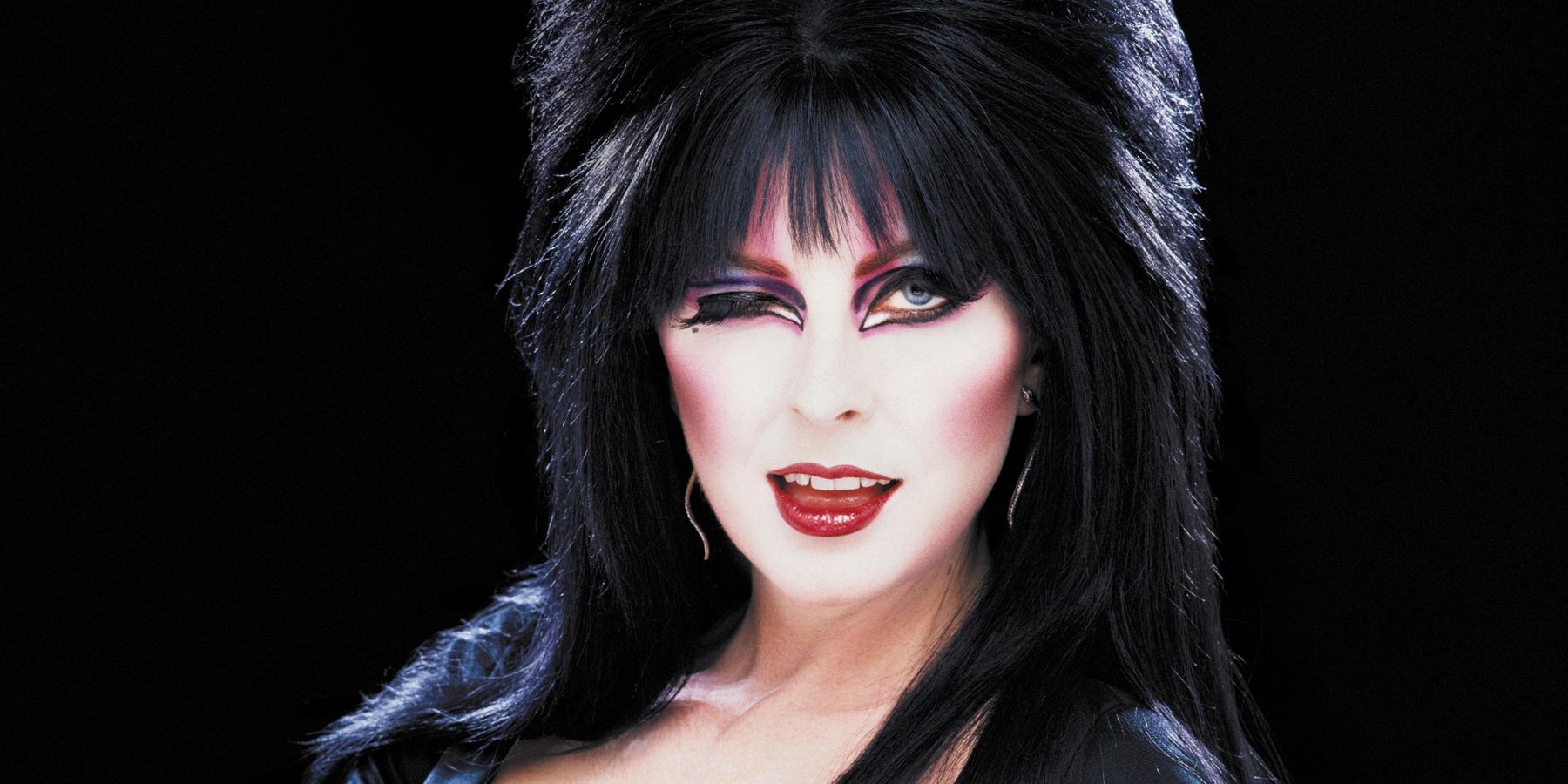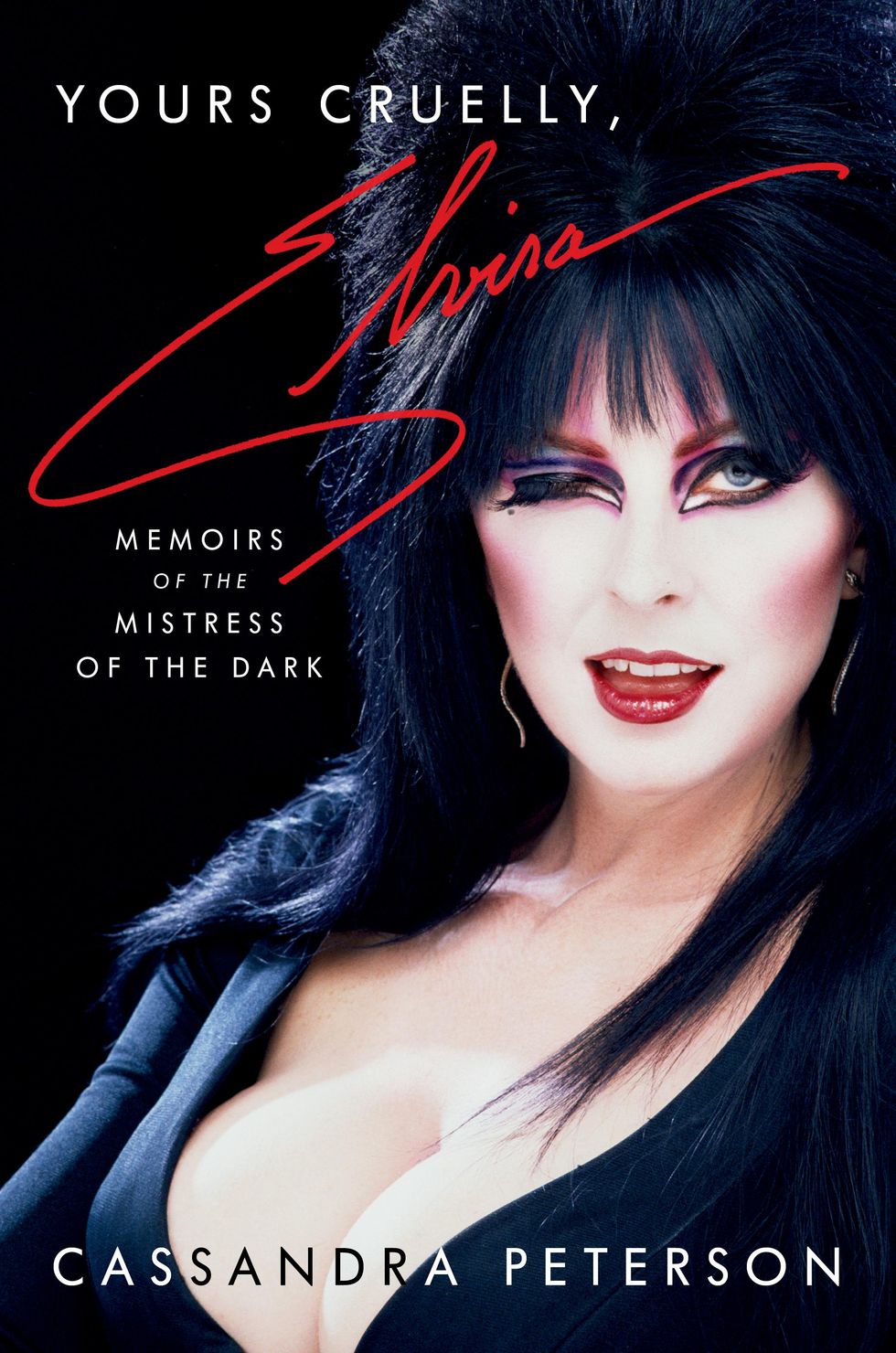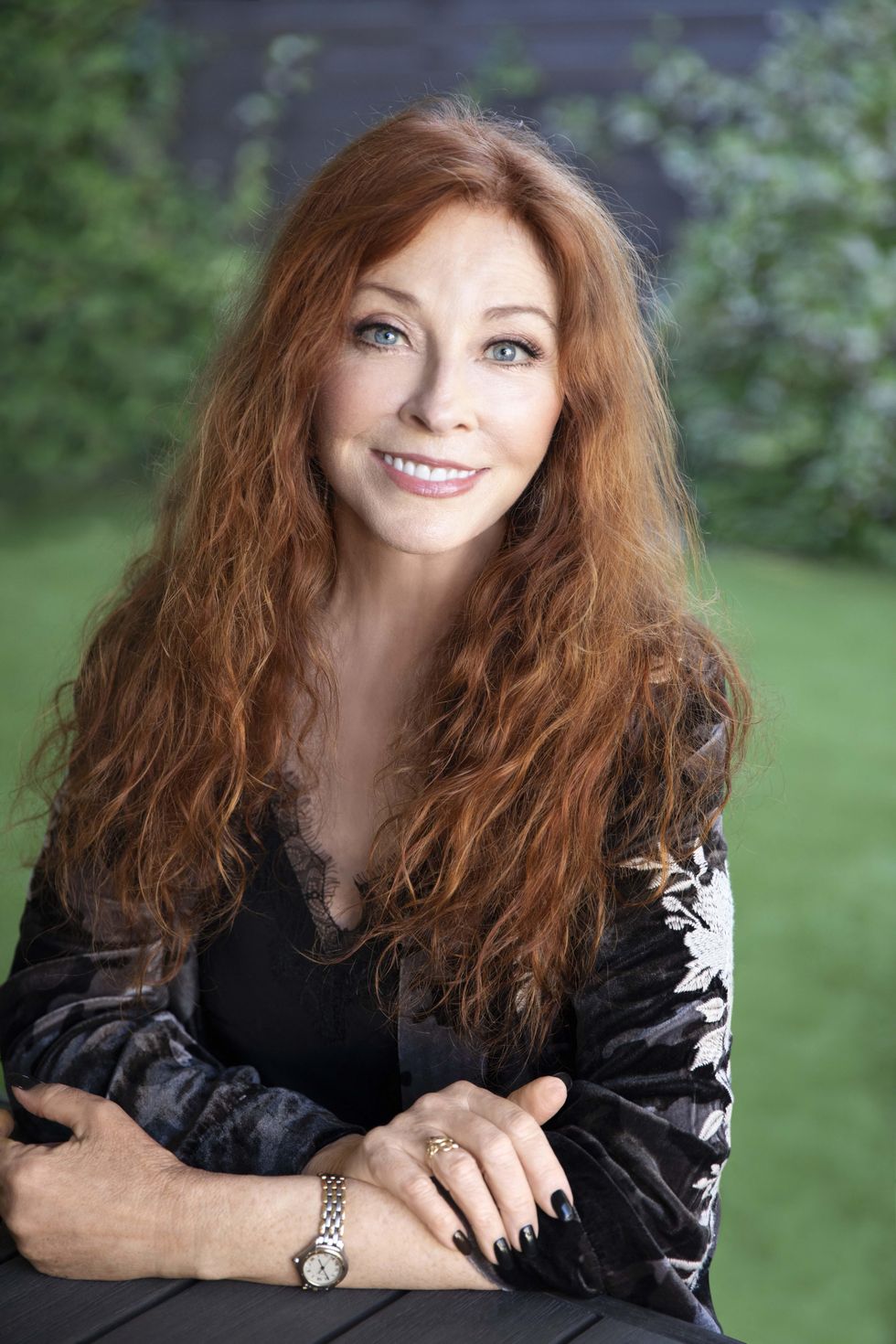
I'm a 30-year-old queer in Bushwick. Of course, I love Elvira. The Mistress of the Dark is an icon and personal hero for many among the LGBTQ+ community, transcending generations during her almost 40-year-plus career. But fewer know the genius responsible for conjuring everyone's favorite ghoulish goddess, actor and comedian Cassandra Peterson. Until now.
In her debut memoir, Yours Cruelly, Elvira, Peterson, who just turned 70 (and looks better than I do), shares all the stories and secrets that I suspect were under what Elvira affectionately dubs as her "knowledge bump." But beyond creating the character who has become known as the Queen of Halloween, Peterson takes us to the beginning. Manhattan, Kansas, to be exact.
From an accident that resulted in third-degree burns covering more than 30% of her body, to discovering a nascent love of horror, to leaving home at 14 and by 17 performing as a showgirl in Las Vegas, Peterson arrives at a crossroads: considered way past her prime by Hollywood standards (she wasn't even... 30), she considers throwing in the towel until she auditions for a local LA channel called KHJ as a late-night horror hostess. And the rest is history.
And, yes, if you're on the internet in the year of our lord 2021, you saw the news that The Advocate broke on late Tuesday, about Peterson coming out in her book and revealing a 19-year-relationship with a woman. A slew of other outlets have picked up the story since, resulting in a celebration rivaling Pride itself. (I mean, Is there any better way to usher in Halloween?)
PAPER spoke to the living legend herself over Zoom about living in secrecy with her partner, the genesis of Elvira and the process of compiling a decades-long career into a book.

Why was now the right time to publish your memoir?
I've actually been thinking about doing this forever. I've been kind of working on it for 15 years, just writing down notes and little stories and things like that. And then it got to the point of if not now, then when?
For those who don't know, a lot of time goes by between writing a book and publishing it. Did the onset of the pandemic have anything to do with your decision to write your memoir?
I did write most of it during the pandemic. It turned out to be good for me in a way because it kept a lot of the other stuff I've been working on at bay; it gave me the time I needed to sit down and write for eight hours a day. I'd go to a little coffee shop and just write. It became my job.
You've lived such a rich life. What was it like organizing all of your stories for a book?
It was a job! [Laughs] This is hard work, I'm not kidding. Honestly, the hardest part was editing them all, because by the time I had all of them compiled, the book was as long as the Bible. I had to start cutting stories, which will hopefully end up in a book one day — if I can make it through this one, first. I have a lot to talk about!
I want to talk about the intersection of funny and sexy. You write, "Women were allowed to be sexy or funny, but not both." What was it to create a character who existed in that intersection?
When I was growing up, there weren't that many comedians who were women. But the ones that were— — ike Phyllis Diller, Totie Fields and Joan Rivers — were categorized as "funny-looking." I can't tell you, even in the '70s, how many auditions I've done that were for comedy roles and they would take one look at me and reject me before I could even read for the role. They were like, "We aren't looking for pretty, we're looking for funny." I'm glad that's not the case anymore, but it was such a weird thing, you know?
"I had [Elvira: Mistress of the Dark], but things started going downhill from there. And not only me, but all horror hosts. No one was hiring us anymore."
Enter Elvira.
I was really lucky. I was performing with the Groundlings back then, in the late '70s and early '80s, always playing the sex symbol. But I still got to do comedy. When I got the part of Elvira, I tried to instill the role with as much comedy as I could because that's what I wanted to do: comedy. Then I also included my showgirl past, too, with that dress. I combined the two to make [Elvira].
I'm very much obsessed with persona: it started with Phyllis Diller for me, and then, of course, I stumbled upon Elvira and there was no turning back.
And you became gay.
Correct. You write that Elvira "became everything Cassandra wanted to be." Initially, the idea for the character was ushered in by the station that was looking for a new horror hostess and, eventually, Elvira became your own. Can you tell me when she felt more like an extension of you as opposed to a job you were hired to do?
For a long time, I would dress up in this wacky outfit and do a job. People used to ask me, "Do you and Elvira share any similar characteristics? Are you two alike?" And I'd say, "No, I am me, and Elvira is a character I play." And, as time went on, I suddenly discovered what Elvira really was: she is me when I was a teenager. I was this cocky, know-it-all smart ass, didn't take any crap from anyone — that was me when I was 15, 16 years old. I had no fear. Elvira is that part of me that was a teenager — a part of it never went away.
What's it like to reflect on creating this character now in the age of the internet, when everyone seemingly inhabits a persona, either consciously (like comedians such as myself) or unconsciously (succumbing to social pressures to curate the best possible versions of their lives)?
It was quite a trip, but I have to tell you: the internet came along and saved my ass.
How so?
Well, TV, and sometimes radio, was my only medium. And I had [Elvira: Mistress of the Dark], but things started going downhill from there. And not only me, but all horror hosts. No one was hiring us anymore. And if it wasn't for the internet, my career would be long over. I know that. Once the internet came, I was able to step things up with social media and really kind of revive my whole career. So many more people became aware of Elvira. And without them, I would have been long gone.

Photography: Pamela Littky
Was there ever a time that you felt a pressure to always be "on"? Have you ever had trouble separating Cassandra from Elvira? If so, how did you find a way for the two to co-exist, if indeed that was the capacity you were thinking in?
I know a lot of comedians — many of whom are "on" all the time — but I don't feel like I'm one of them. They're hard to be around [Laughs]. I never felt that pressure, especially because I look so different. It was easy to separate myself from the character because I never get recognized. I'm a lucky actor — I don't think anyone has it better than me or Pee-wee Herman because we can be completely different people. I don't feel a pressure to be on or funny or look a certain way.
Did that help with the book-writing process, that ability to separate?
It did. The hardest part to write of the book — not emotionally — was to write about when Elvira started. It felt like I was writing my resume. It got tedious. Obviously, the fans are going to want to know that stuff, but for me it felt like I was reporting.
Beyond that, you reveal that you've been in a relationship with a woman for almost 20 years now. What was it like to write about it in such a public capacity?
It was hard. I feel embarrassed that I hid this. I had to come out with this at some point because I just can't stand hiding it and not being able to be myself. And my poor partner has to live in secrecy, too. I had to come out about it. I'm worried that I'll lose some fans because Elvira is this sexy lady who's always after men, which is what I've been like my whole life [Laughs] and then suddenly this happens, and it feels like I've been lying — both to my fans and myself. I'm going to be so relieved that everyone knows.
You wrote that the only reason you didn't come out sooner was because you were protecting Elvira.
That was the one and only reason: I was protecting a character. I don't care about myself, but Elvira has this reputation as a big horn dog and she's always after guys, you know?
"I sort of hate labels! When friends ask me, 'When did you know you were a lesbian?' I respond with, "I didn't." I've never considered myself a lesbian; I just have a relationship with a woman. I'm still attracted to men, too."
But I feel like if we were to extract Elvira from you, she would applaud you.
That's true. Elvira would be like, "This is awesome!" I just hope that I don't get any flack from my LGBTQ+ fans. I just feel hypocritical, you know? I just want them to know that I hid this for so long because I was trying to make a living. I didn't want the character to disappear.
I like that you don't put a label on it: you never explicitly say you identify as gay, queer, pan, or what have you.
Right. I don't want to put a label on it. I sort of hate labels! When friends ask me, "When did you know you were a lesbian?" I respond with, "I didn't." I've never considered myself a lesbian; I just have a relationship with a woman. I'm still attracted to men, too. Not that anything is wrong with being a lesbian, I just don't happen to feel that way. Maybe I am! Who knows. And if I am, I'm happy with that, too.
You also do a great job writing about how emotional abuse is blind to its victims: no matter how self-actualized you are, or how confident, it can still pull the rug out from underneath you. It's been about 20 years since your divorce to your ex-husband. What's it like to write about it now, 20 years later?
It's a really hard thing to write about. But it's my life and I had to write about it. So many women whom I've met and know — and men, too — have experienced [emotional abuse]. So many people don't fully understand what verbal and emotional abuse is. They don't see any scars or black eyes, and think that those experiencing it should build a thicker skin. It's so much more soul-crushing than these people who think that way realize. And it's really hard to get over. I had the same relationship with my mother — she was physically abusive, too — but the part that stayed with me much longer in my life than any bruise was the emotional and verbal abuse. And that happened when I was seven years old. Writing this book helped me with that.
Can you share how?
I think that, by the end of the book, I learned how to forgive and forget. I had a very difficult relationship with my mother for all of my life. I was able to work through it in the book. In the end, I realized she was just doing the best she could. She had a hard upbringing: she was in foster care her whole life because her mother died when she was nine. She had a lot of issues and she took it out on me. I got away from it, luckily, when I was 14. My two sisters did not — and, consequently, they died from drug and alcohol abuse. I learned that people mostly do the best that they can do at the time with what they have. It wasn't like my mother was a horrible monster. Her friends thought she was a saint and to other people she was. But that's not the part I knew. Through the book, I was able to work through that, her passing and our relationship. Writing this book saved me a million dollars in therapy [Laughs].
Is there anything else you want to talk about? I have literally all day for you.
[Laughs] I think people will be very interested in the things that are in the book because they're things that I've never really mentioned. I think people will be surprised, and I hope it will give people inspiration and teach them that you can come from nothing and realize that it's not just about hard work, but perseverance.
I have one more question: before we part, can you do it?
[Winks] Unpleasant dreams...
Photos courtesy of Elvira
From Your Site Articles
- Kim Petras Drops ''Turn Off the Light" Halloween Album - PAPER ›
- Nasty Cherry Premieres "What Do You Like In Me" Music Video ... ›
- Boo Ah! Kim Petras Gets Spooky With Halloween Icon Elvira - PAPER ›
- TikToker Peach PRC Comes Out - PAPER ›
- TikToker Peach PRC Comes Out - PAPER ›
Related Articles Around the Web